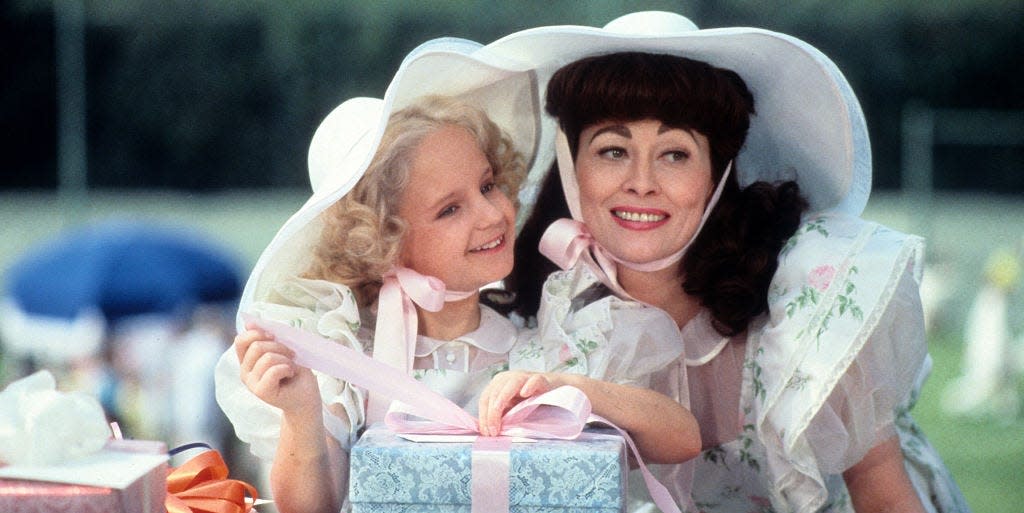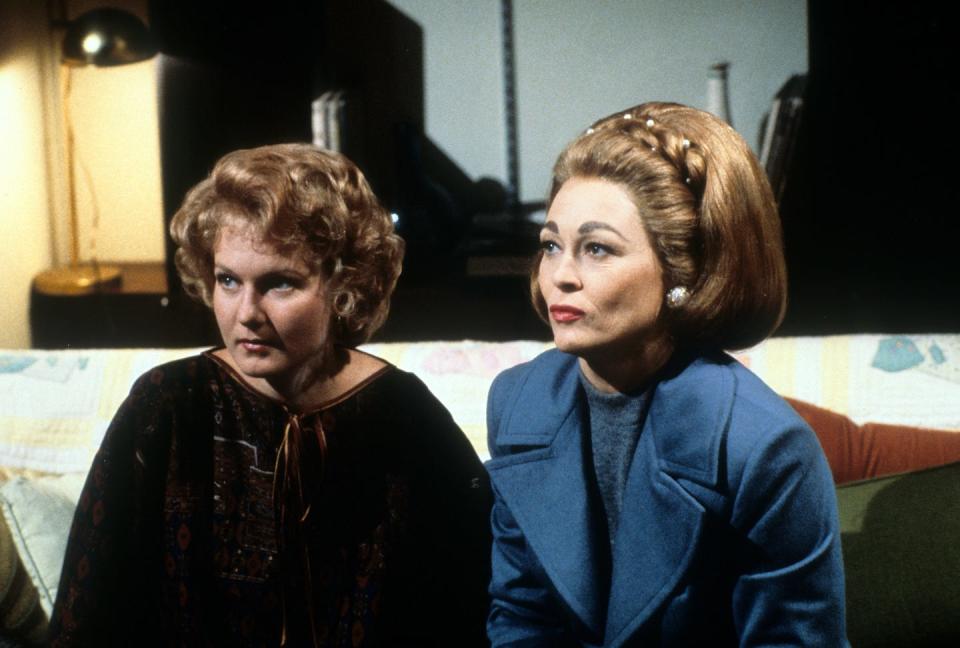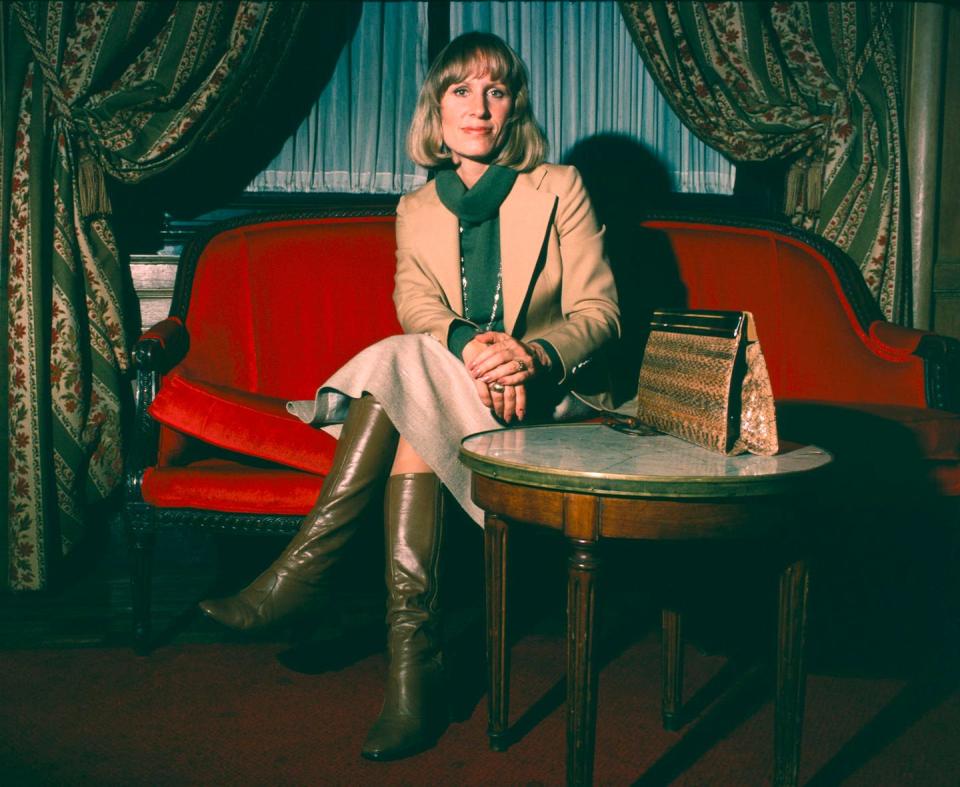Mommie Dearest is Secretly the Best Mother's Day Movie

- Oops!Something went wrong.Please try again later.
- Oops!Something went wrong.Please try again later.
- Oops!Something went wrong.Please try again later.
"Hearst Magazines and Yahoo may earn commission or revenue on some items through the links below."
Isaac Calpito, the fitness guru behind Torch'd, was poised on the floor with his legs akimbo. “I work and work until I’m half dead,” he said into his phone’s camera. “And I hear people saying, ‘She’s getting old...’” While this might sound like a saucy kvetch mid strenuous workout, for many in his audience the reference was unmissable. It's the third line in the infamous, nearly seven-minute “No Wire Hangers” tirade from the camp classic Mommie Dearest, which turned 40 last year.
In the decades since the film’s initial release, Mommie Dearest, starring Calpito pal Faye Dunaway as Joan Crawford, has been elevated to a level unique even among other cult favorites. Its dialogue is shorthand for many, especially gay audiences, and the film continues to inspire imitation, turning up in all manner of memes. “Merry Christmas!” reads one with Dunaway in character. “Except Christina.” “PPE for Everyone!” reads another. Beat “Except Christina.” Since this maligned biopic opened, Rocky Horror Picture Show-style midnight screenings have drawn attendees brandishing wire hangers, cleaning supplies, and ingenious costumes, like a gray track suit appropriately stained with sweat, a reference to the scene where Crawford jogs, huffing her mantra, “Survive. Survive. Survive.”
For the uninitiated, Mommie Dearest chronicles the parenting years of legendary Golden Age of Hollywood diva Joan Crawford and the demanding, sometimes unhinged abuse she poured on her two adopted children, Christopher and Christina. It is based on Christina's memoir of the same title. The film has become infamous for its ludicrous language, sumptuous furnishings, and over the top acting with a capital A. It should also be singled out for praise as a great Mother's Day movie: mainly, as a How Not To Parent handbook—in extremis.
Though its mere mention today mostly inspires giggles, the movie’s origins were auspicious. Filmmakers had every intention of making a serious look at the horrors of child abuse, the sort of film that today might be labeled awards bait. “Mommie Dearest was supposed to be one of the big awards films of the season,” said Izzy, the cineaste behind the Be Kind Rewind YouTube channel. The resulting film “felt more embarrassing because it was supposed to be prestige.”

Christina Crawford’s memoir was published in October 1978, a year after her mother’s death. A few months before then, film producer Frank Yablans purchased the film rights, telling Parade in 1978, “I see it as a love relationship between a mother and daughter. That’s what makes it so fascinating. Sometimes mothers have a strange way of showing their love.” Enthusiastic about telling a moving and sobering story, Yablans's initial choice for a director was Franco Zeffirelli, then best known for his 1968 film adaptation of Romeo and Juliet.
It was in these early stages that the film’s first leading lady came on board. Anne Bancroft, Mrs. Robinson in The Graduate, was an Oscar-winning actress who had known the real Joan Crawford. But she was reluctant to approve the early screenplays by the younger Crawford and soon bowed out, as did Zeffirelli, who wouldn't consider any other actress besides Bancroft. Frank Perry, once nominated for Best Director at the Academy Awards, was brought on instead. Yablans claimed Sigourney Weaver was also in the running for the lead, but eventually it was Dunaway, fresh off winning a Best Actress Oscar for Network, who allegedly turned up on Perry’s doorstep dressed as Crawford in an overture for the part. She got it.
“They tell you what to say, they tell you what to do, these characters,” Dunaway would write in her 1995 autobiography, Looking for Gatsby, “This is what happened with me and Crawford.” While the duo of Franks finally tinkered the screenplay into submission themselves, two additional executive producers made their presences felt. The first was David Koontz, Christina Crawford’s husband. And the second was Terry O’Neill, Dunaway’s then boyfriend and later husband, on whose producing credit her participation was contingent. (It was O’Neill who would take the iconic portrait of Dunaway with her Oscar by the pool at the Beverly Hills Hotel.)

“It was a war from the beginning,” Dunaway wrote, “Christina’s husband was the other executive producer, so he was there pushing her point of view, and Terry was there trying to protect mine. And Joan’s.”
Dunaway set out to portray Crawford as a more fully dimensional being than what came across in the daughter’s book. While ostensibly the only source for the film is the memoir, with Faye’s desires in mind, the scope began to include more than the view of the child. It was a lesser known book published in 1980 that began to play just as much of an important role, Conversations with Joan Crawford by Roy Newquist. It is in this book that Joan Crawford is presciently quoted, “Of all the actresses—to me only Faye Dunaway has the talent and the class and the courage it takes to make a real star.”
The Conversations book is a condensed series of interviews conducted by the author over the last 15 years of the glamour queen’s life. And though serious Crawford acolytes take issue with the book’s veracity, it is nonetheless an obvious source for Mommie Dearest, with lines lifted in entirety for the script, like, “I really should have had ‘Property of M.G.M.’ tattooed on my ass.” In the film, Faye delivers a version of this and slaps her rear end for effect.
When Roger Ebert paid a visit to the film's closed set in 1981, Perry told him, “We've also used a book named Conversations with Crawford as a source. We're trying to tell the story right down the middle. To me, it's a story of how love missed its object in both directions.”
When it came to missed targets, the immediate reception of the film was decidedly mixed. The legendary critic at The New Yorker, Pauline Kael, gave Dunaway, if not the film, a qualified rave: “She digs into herself and gets inside ‘Joan Crawford’ in a way that only another torn, driven actress could.” While critics were divided, the audience was in hysterics. Reflecting on their reaction, Kael quipped, “You can’t help laughing at the movie but you can’t laugh at her.”
Latching on to the public's take, Paramount launched an ad campaign featuring an enormous wire hanger, with a tagline that read, “The biggest mother of them all.” Yablans would file suit against the studio, claiming the ad was “embarrassing.” The action was rejected out of court, and the promo continued to be used.
The film opened without fanfare, or a red carpet premiere. Rutanya Alda, who played Carol Ann, would buy her own ticket to see the film at the Loew’s Theater on Broadway when it opened. “When the laughter started I was taken aback, but I thought, ‘People are really enjoying this movie,’” she told me in an interview by phone. Alda kept a diary while making the film, and published it as a book, The Mommie Dearest Diary: Carol Ann Tells All, in 2016. “You never know. The audience is a wonderful thing. Especially the gay audience. They are so wonderful about keeping this alive.”
Dunaway, meanwhile, has only reluctantly broached the topic, and Mommie Dearest must be at the top of her list of verboten subjects, likely followed by her presenting snafu with Warren Beatty at the 2017 Academy Awards. She declined to speak to me for this story, but told People in 2016 that she still believed the project was a mistake: “I should have known better.” Alda disagrees: “Every time I’ve done an appearance, there’s so much love. It’s such an incredible feeling. To be in a cult movie that is celebrated, it’s beyond words.”
In the time since Mommie Dearest's release, we’ve handled the socks and told the fellas not to fuck with us, but most of all, we've stayed fascinated by both the OG screen goddess and the woman who portrayed her so memorably. Whether it’s the dynamite wardrobe, the lavish sets, the inexhaustibly quotable dialogue, or the sheer catharsis of screaming back at the screen, “No Wire Hangers,” Crawford and Dunaway made for the perfect storm of a story that lasts.“People are more apt to make fun of people they love,” said Izzy, of Be Kind Rewind.
“I admire her,” Alda said of the real Crawford. “I think all of us need that kind of person. To look up to and say, ‘Well, look at all the crap she went through and what she had to do to keep on top.’” And of the Joan Crawford in Mommie Dearest, she added, “It can be inspirational to go and see this woman not be defeated. It doesn’t matter if it’s by her kids or anybody else.”
Forty one years on, the indomitable spirit of the biggest mother of all is still with us, with a message for everyone. Except Christina.
You Might Also Like

